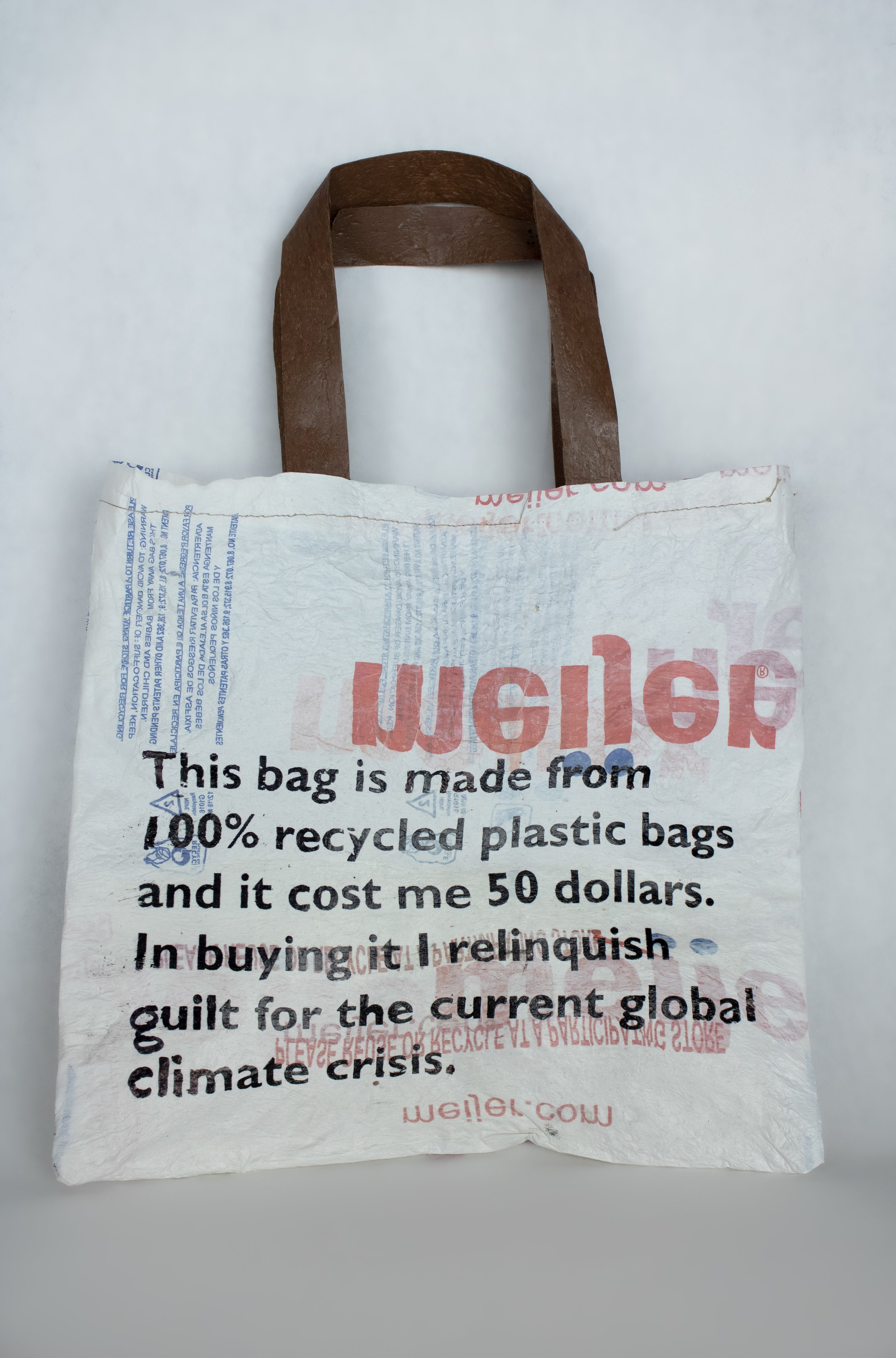$50 Bag
Spring 2020
A Modern-Day Indulgence
As a shift in cultural consciousness towards accepting the scientific fact of human-caused climate change, it is paramount that we do not lose sight of the realities of our personal relation to this crisis as minuscule compared to the institutional polluters of governments and companies.
The economic models of environmentally conscious companies like Patagonia and Lush use their efforts in sustainability to sell products, charging a premium for that sustainability. This allows for reverence of corporations that become the cultural institutions we center ourselves around, allowing the environmentally conscious to partake guilt-free in conspicuous consumption. Yet the continual consumption and discarding of material is inherently unsustainable. Furthermore, as the rich have the recourses to buy these high-priced goods, they are allowed to feel devoid of blame, instead deflecting that blame on people who consume objects without thought of environmental repercussions. This lack of guilt is invalid. Conspicuous consumption itself, whether enviornmental or otherwise, exact urge to participate in conspicuous consumption in any form without necessity that causes the climate problem.
For example, many today know of the horrific effect the meatpacking industry has on animals, factory workers, and the environment. In response, many rich pay premiums to buy “sustainably sourced” meat. In purchasing this meat, the consumer relinquishes guilt for the unethicality of the meat industry. However, “sustainable meat production” uses vastly more land than traditional factory farms, meaning that with the current demand for meat, there is not enough land on earth to accommodate this demand. Thus the only way to sustainably consume meat is by reducing consumption. Many of the environmentally-conscious turn to vegetarianism and veganism (I am included in this) to further relinquish their guilt, and while their environmental impact will be less the time, money, and nutritional information to make this transition is yet another byproduct of their privilege. So through their money, the rich can feel without guilt for the meat industry while the poor must choose between malnutrition and immense sacrifice to achieve the same goal.
In the late middle ages, the rich within the Christendom of the roman catholic church could give money to the clergy to reduce the guilt from their sins and the resulting purgatory they would face before being allowed to enter heaven. “As soon as a coin in the coffer rings, a soul from purgatory springs.” This quote taken from Martin Luther was integral to his critique of the practice of indulgences. Similarly, today, the wealthy buy their way out of guilt. Indulgences are meant to lessen the time spent in purgatory in a religious context; today, with the predominant gospel being science, one can escape the moral purgatory of environmental destruction through a similar exchange of capital.
The most blatant example of “the modern indulgence” is the carbon offset. A carbon offset is a “certificate” that one buys to offset their carbon footprint. For example taking an airplane increases a personal carbon footprint. So, the environmentally-conscious person unburdens themselves of this footprint by paying corporations like Native Offset to negate the carbon emissions from their travel. Native Energy then invests this money into projects creating renewable energy systems. This allows one to “consume” as much carbon as they like, without guilt. However, it is necessary that we collectively diminish our carbon emissions and not just offset them. Efforts to promote renewable energy are required to combat climate change, but the work that carbon offsets do is negated by the permission they give to continue energy consumption. To create change at scale it will take corporations but mostly governments to invest in broad-scale projects like the green new deal.
None of what I have said is meant in any way to discourage an environmentally sustainable world or living practices. I am merely arguing that instead of looking at environmental impact personally, one should look at a societal level. Instead of blaming each other for limiting or maximizing our negligible personal impacts, we must instead look to the corporations and governments, which have the power to make a substantial and effective change on the global scale. Shifting our frame of focus requires us to participate in revolutionary, not personal, change.
To expose the hypocrisy of environmentally ethical consumption, I have embodied the roll of the corporations mentioned above. I also want to control my environmental impact so my product is made from recycled materials; grocery bags. I have taken these bags and fused multiple layers of them with heat to create a sturdy fabric. Then I have sewn this fabric into a traditional tote bag with handles suitable for groceries, everyday use, etc. On the bag, I have screen-printed the following phrase;
“This bag is made from 100% recycled plastic bags and it cost me 50 dollars. In buying it I relinquish guilt for the current climate crisis.”

